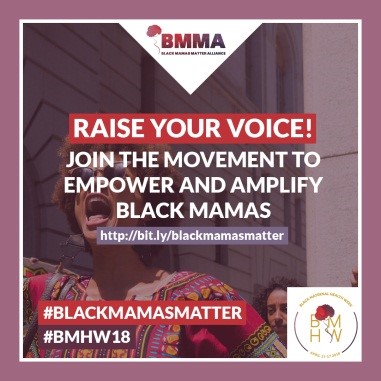When tennis star Serena Williams recently revealed her near-death experience following the birth of her daughter, she called new attention to an alarming and persistent health disparity. Black women in the United States are three to four times more likely to die from pregnancy or childbirth-related causes than are white women, according to the Centers for Disease Control (CDC).
What can be done to address this health crisis? The Black Mamas Matter Alliance is sponsoring a Black Maternal Health Week from April 11 to 17 to raise awareness and help support the development of solutions through community-driven policy advocacy and health systems change. The week of activities includes several information webinars that will amplify the issues:
- Wednesday, April 11 at 12PM EST: Black Maternal Health Week launch webinar. Register here.
- Thursday, April 12 at 12PM EST: "Best Practices in Black Mama Care Work” webinar. Register here.
- Monday, April 16at 12PM EST: BMHW Webinar highlighting African Immigrant women advocacy in maternity care. Register here.
 While maternal health outcomes have greatly improved among mothers of other races, the outcomes of Black mothers have seen little to no change in recent years. The durability of the disparity is an indicator of the existing fundamental inequities that drive poor health outcomes. Black women are more likely to live in neighborhoods with insufficient access to healthy foods, be uninsured before pregnancy and thus start prenatal care later, and give birth in hospitals with markedly higher rates of complications.
While maternal health outcomes have greatly improved among mothers of other races, the outcomes of Black mothers have seen little to no change in recent years. The durability of the disparity is an indicator of the existing fundamental inequities that drive poor health outcomes. Black women are more likely to live in neighborhoods with insufficient access to healthy foods, be uninsured before pregnancy and thus start prenatal care later, and give birth in hospitals with markedly higher rates of complications.
But the racial disparities in maternal mortality and morbidity persist across women of all income and educational levels. Many Black women of all incomes and educational levels report chronic stress associated with the constant discrimination and obstacles faced because of being both Black and a woman in America. Studies have shown that Black college-educated mothers are more likely to suffer severe complications of pregnancy or childbirth than white women with less than a full high school education.
For example, Serena Williams suffered a pulmonary embolism that nearly killed her a day after giving birth last September. She told a Vogue magazine interviewer that she had to fight to get the emergency care she needed from health providers who doubted what she was telling them about her symptoms, including shortness of breath. Williams said she persisted because she knew that she had a history of such embolisms.
“Racism is creating these inequities,” explained Dr. Joia Crear-Perry, an obstetrician-gynecologist who is a member of the steering committee of the Black Mamas Matter Alliance and Community Catalyst board member. Speaking at the New York Maternal Mortality Summit, she said that “When you see inequities in health, don’t think about individuals. Think about systems, because systems create inequities.” She is founder of the National Birth Equity Collaborative.
What can be done to help address this health disparity? The Black Mamas Matter Alliance has prioritized driving research, advocacy, clinical improvements, empowerment of Black women, and cultural change: “We envision a world where Black mamas have the rights, respect and resources to thrive before, during and after pregnancy.”
Empress James is a graduate student at Columbia University interning with the Community Catalyst Women’s Health Program
